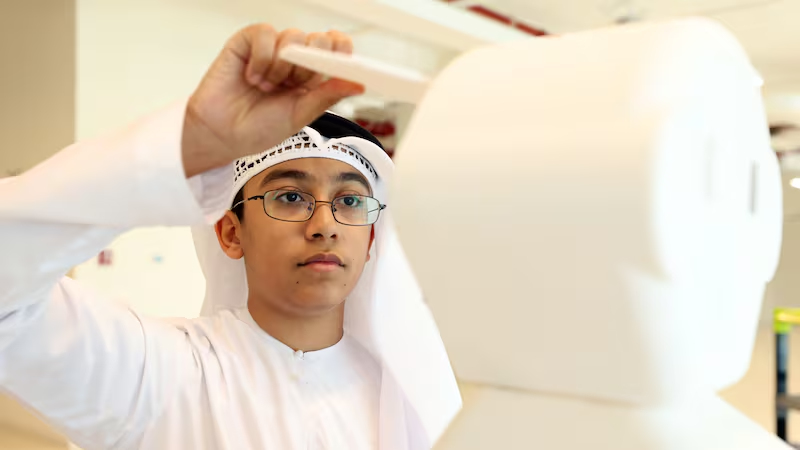At a time when technology has never been so advanced and accessible, children beginning their education journey today are on a profoundly different path to that walked by previous generations. Some of their older parents will remember the days when photographs were developed from rolls of film, important messages were sent in the post and “google it” was not an option; their children live in a word of instant communication and unparalleled access to collected human knowledge.
In the UAE, not only are many classrooms equipped with the latest digital teaching aids, many pupils already have some form of smartphone – effectively a handheld computer that would have been considered incredibly advanced just two decades ago. These changed circumstances are spurring the evolution of UAE education policy. “Our responsibility is to equip our children for a time unlike ours,” Sheikh Mohammed bin Rashid, Vice President and Ruler of Dubai, said on Sunday while announcing that artificial intelligence is to be introduced as a subject across all stages of government education in the Emirates, including kindergartens.
As a country that has wholeheartedly embraced this paradigm shift in technology – in 2017, the UAE became the first nation in the world to appoint a government minister for AI – it makes sense that it wants the next generation, even children as young as four, to not only be familiar with AI but know how to harness its potential wisely. Therefore, it is important to note that included in the new curriculum are seven areas of focus, one of which is ethical awareness. This reflects Sheikh Mohammed’s statement that the new AI lessons are aimed at “enhancing [pupils’] understanding of its data, algorithms, applications, risks, and its connection to society and life”.
However, although these are new additions to the school curriculum, they are a continuation of previous efforts to place ethics at the heart of learning. In 2018, the UAE introduced the study of morals and ethics for pupils from the age of six until they leave school. This was a challenging and noteworthy addition to the school curriculum but one that was important for a country with a diverse population. Embedding similar concepts in the study of AI is a step towards combining digital literacy with responsibility.
When the new curriculum is introduced in the next academic year, the UAE will be a country where the study of AI begins in pre-school and could potentially last until the doctoral level at institutions such as the Mohamed bin Zayed University of Artificial Intelligence. Although several other nations are rolling out AI learning for younger children, few will have artificial intelligence as subject from kindergarten to tertiary level.
In this sense, the UAE has an opportunity to lead the way on what will be a journey of continual evolution. This week Abu Dhabi has hosted the inaugural Governance of Emerging Technologies Summit while in Dubai, Gisec Global – billed as the Middle East and Africa’s largest cybersecurity event – is taking place. Such events show the dynamism that is propelling development in AI and other advanced tech. A school curriculum that includes AI will need to be flexible and adaptive to keep up with the pace of change and remain relative. In this way, it will help prepare a new generation of youngsters for the exciting and daunting challenges ahead.







